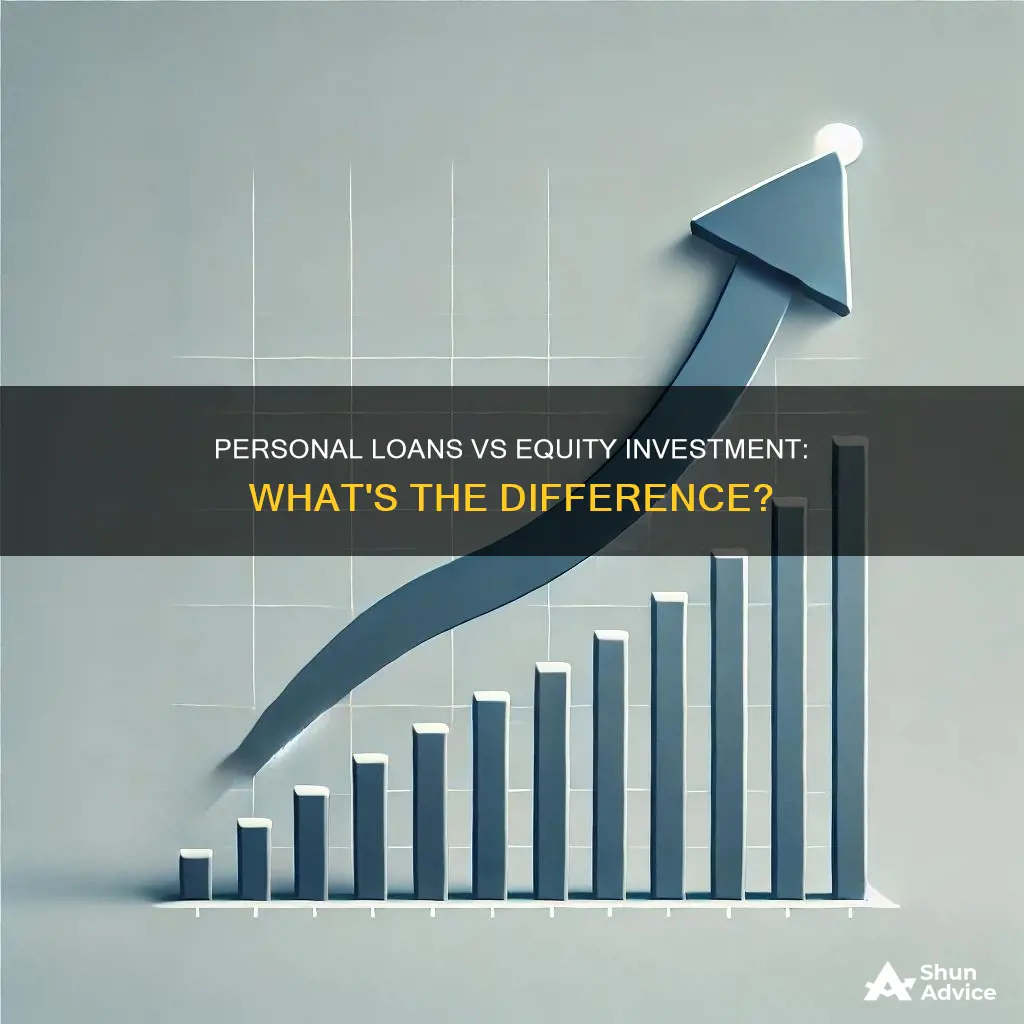
Personal loans and equity investment are two very different financial tools, each with its own advantages and disadvantages. Personal loans are typically unsecured and are often used for debt consolidation, emergency expenses, or small business funding. On the other hand, equity investment refers to investing in stocks, mutual funds, or similar investments using funds from a personal loan. While this can be a risky move, it may be worthwhile if it enhances your career or financial standing. Home equity loans, a type of secured loan, are also an option for those with sufficient home equity and can offer lower interest rates and longer repayment terms than personal loans. Ultimately, the best choice depends on an individual's financial situation, including their credit score, income, and intended use of the funds.
What You'll Learn
- Personal loans are unsecured and your credit score and income determine the rate
- Home equity loans are secured by your home and have lower interest rates
- Personal loans are suitable for emergency expenses
- Home equity loans are suitable for large home improvement projects
- Personal loans are good for debt consolidation

Personal loans are unsecured and your credit score and income determine the rate
Personal loans are unsecured, meaning you don't need to put up collateral to secure the loan. Instead, approval is based primarily on your credit score and finances.
Your credit score is a window into your debt and repayment history. It is a key factor in determining whether you will qualify for a loan and the rate you will be offered. The higher your credit score, the more likely a lender will approve your loan application and offer more favourable terms, such as a lower interest rate.
The most commonly used credit score system is FICO, with scores ranging from 300 to 850. Generally, the minimum credit score for a personal loan is 580. To qualify for a lender's lowest interest rate, you typically need a score of at least 800 and a high income.
Your loan rate will depend on your credit score and credit history. The higher your score and the better your history, the lower your interest rate and monthly payments will be. The average rate for a 24-month personal loan was 12.33% in Q3 2024.
Personal loans can be a good way to build your payment history, improve your credit mix and reduce your credit utilisation ratio. However, taking out a personal loan may have a slight negative impact on your credit score in the short term as you have acquired additional debt.
In addition to your credit score, lenders will also consider other factors such as your income and employment status when determining the rate for a personal loan. Lenders want to see that loan applicants have a history of responsibly paying off debt and a stable income to ensure they can make the monthly payments.
LLP Route: Investing in India's Future
You may want to see also

Home equity loans are secured by your home and have lower interest rates
Home equity loans are a useful way to access the equity built up in your home. They are often referred to as second mortgages because you have another loan payment to make on top of your primary mortgage. The loan uses your home as collateral, which means that if you default on the loan, the lender can foreclose on your home.
Home equity loans usually have lower interest rates than other types of consumer loans because they are secured by your home. The interest rate on a home equity loan is typically fixed, so it remains the same throughout the term of the loan. This means that your monthly payments will be consistent and will not change.
The process of getting a home equity loan usually involves getting your home appraised to determine how much money you can borrow. The lender will also consider your debt-to-income ratio and your credit score to assess your ability to repay the loan.
Home equity loans provide borrowers with a large, lump-sum payment that is repaid in fixed installments over a predetermined period. The loan amount is based on the difference between the home's current market value and the homeowner's mortgage balance.
While home equity loans offer lower interest rates, it is important to carefully consider the risks before taking one out. Defaulting on the loan could result in the loss of your home. Additionally, if you sell your home, you will have to pay off the entire balance of the loan, along with the remaining balance of your primary mortgage.
Investment Bankers: Secrets to Managing a Hectic Life
You may want to see also

Personal loans are suitable for emergency expenses
Personal loans are a good option for emergency expenses because they are quick and flexible. Lenders can often approve and fund personal loans within a day or two, and sometimes even on the same day. This makes them ideal for emergency expenses, which are often time-sensitive.
Personal loans are also flexible in terms of usage. They can be used for almost any purpose, including emergency expenses such as unexpected medical bills, last-minute essential travel, and emergency home repairs.
Personal loans are typically unsecured, meaning they don't require collateral. This is another reason why they are suitable for emergency expenses—you don't need to put up any assets, such as your home or car, as security for the loan.
However, it's important to keep in mind that personal loans may have higher interest rates than other options, such as home equity loans. They may also come with fees, such as origination fees, late payment fees, and prepayment penalties. Therefore, it's essential to compare different lenders and consider the total cost of the loan, including interest rates and fees, before making a decision.
Investing at 25: Building a Balanced Portfolio for the Future
You may want to see also

Home equity loans are suitable for large home improvement projects
Home equity loans are a good option for those looking to undertake large home improvement projects. They are a type of secured loan, with the borrower's home used as collateral. This means that the lender can seize the borrower's home if they fail to make their payments. As such, home equity loans tend to have lower interest rates than unsecured loans, such as personal loans. The lower interest rates, combined with the fact that home equity loans are usually paid back over a longer period, result in lower monthly payments. This makes them a good option for large home improvement projects, which can be costly. For example, the average kitchen remodel cost $25,656 in 2022.
However, home equity loans are not the best option for everyone. They usually require a lot of paperwork and can take a long time to be approved, whereas personal loans usually only require basic documentation and can be approved within days. Home equity loans also require the borrower to have built up equity in their home, which may not be the case for those who have recently bought a house. Additionally, there is a risk that the borrower could lose their home if they are unable to make the loan payments. As such, it is important to carefully consider your financial situation before taking out a home equity loan.
NRIs: Smart Ways to Invest in India
You may want to see also

Personal loans are good for debt consolidation
Personal loans are a good option for debt consolidation, especially if you have several high-interest loans. However, it is important to understand the pros and cons of debt consolidation before committing to a new loan. Here are some reasons why personal loans are good for debt consolidation:
Streamlined Finances
Consolidating multiple debts into a single loan reduces the number of payments and interest rates you have to manage. This can help improve your credit score by reducing the chances of making late or missing payments. With fewer payments to track, you will also have a better idea of when your debt will be fully paid off.
Expedite Payoff
Personal loans can help you pay off your debt faster and save money on interest, especially if the interest rate on the consolidation loan is lower than the rates on your existing debts. Making extra payments with the money saved each month can further expedite the payoff process.
Lower Interest Rate
If your credit score has improved since taking out your original loans, you may qualify for a lower overall interest rate by consolidating your debts. This can result in significant savings over the life of the loan, even if you don't consolidate with a long loan term. Shopping around and pre-qualifying with multiple lenders can help you secure the most competitive rate.
Reduced Monthly Payment
Debt consolidation can lead to a lower overall monthly payment because future payments are spread out over a new and potentially longer loan term. This can provide some budgetary flexibility, although it is important to note that you may end up paying more over the life of the loan, even with a lower interest rate.
Improved Credit Score
Debt consolidation can positively impact your credit score in several ways. Paying off revolving lines of credit, such as credit cards, can reduce your credit utilization rate. Making consistent, on-time payments and ultimately paying off the loan can also boost your score over time.
The All-Weather Portfolio: Why You Shouldn't Invest
You may want to see also
Frequently asked questions
A personal loan is an unsecured installment loan given to the borrower as a lump-sum payment. It is not backed by collateral such as a home, boat, or car. These loans are typically available from traditional banks, credit unions, or online lenders and are repaid in equal monthly payments with a fixed interest rate.
Personal loans are typically easier and less expensive to obtain than traditional loans. They also often have lower interest rates than credit cards, especially if the borrower has a good credit score.
Personal loans can be used for various expenses, such as debt consolidation, home improvement, auto expenses, medical expenses, credit card payoff, small businesses, or large purchases. The most common use is consolidating high-interest credit card debt.
To qualify for a personal loan, you typically need a valid ID, regular income, a checking account, and a good credit score. The minimum acceptable credit score usually falls within the range of 600 to 700+.
Private equity refers to investments made in companies by private investors, such as high-net-worth individuals, firms, or organizations like pension funds. These investors typically join together in a partnership to form a private equity fund, aiming to increase the value of the target company and their investment return.







